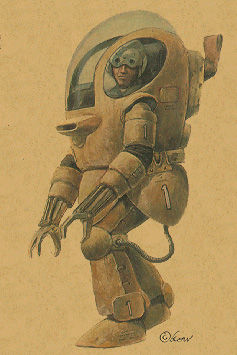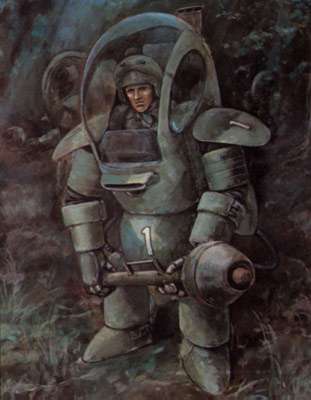|

|

|
Images copyright by Kow Yokoyama.
|
| Niebelungen Armored Wepon Factory |
| 1,001 - 12,032 |
| 1 |
| 0.33 tons |
| 0.98 m |
| 1.32 m |
| 1.70-2.05 m |
| Maybach 210 TRM |
| 48 kph |
| 150 km |
| FuG40/a-1 |
| KgZF2/12a |
| 2 Neupanzerfaust |
| |
| 5 mm tungsten armour
8 mm special heatproof ceramic armour |
|
| Niebelungen Armored Wepon Factory |
| 12,033 - 43,011 |
| 1 |
| 0.34 tons |
| 0.96 m |
| 1.33 m |
| 1.70-2.05 m |
| Maybach 220 TRM |
| 48 kph |
| 150 km |
| FuG40/a-2 |
| KgZF2/12b |
| 2 Neupanzerfaust |
| |
| 5 mm tungsten armour
10 mm special heatproof ceramic armour |
|
The Hornisse of the Shutoral forces, developed to counter the new AFS
of the
Mercenary troops, was an epoch-making new weapon which broke previous
concepts in
armoured fighting suits. The PKA was a cockpit, for the lightweight
armoured scout fighter, capable of independent actions. Though the PKA,
as a rule acted as the Hornisse by combining with the PK 41, it was
often used as an independent weapon.
Being mainly an airmobile unit, the PKA had a lot more
requirement for vision than the AFS, and as such, the head unit was
mostly made from armoured glass. This was enough to protect the pilot
from near hits and fragments, but not enough to prevent penetration by
the AFS laser or direct hits from larger shells. Due to the
modifications needing to made to the PK 41, some 200 PKA Heinrich suits
were produced before any went into combat, but when it arrived on
Earth, these suits saw combat almost instantly with the 150th Armoured
Hunting unit where they attacked and destroyed a Sandstalker column.
The PKA H1 was an improvement over the H0 in many ways. The
armour was increased, as was the equipment carried - radio and sights
for example. However, the weak point of the suit - the glass canopy -
still remained, and no fixed armament was mounted.
These points wouldn't be solved until the introduction of the PKA G,
which redesigned the basic H suit, and would then develop into the K
series.
|